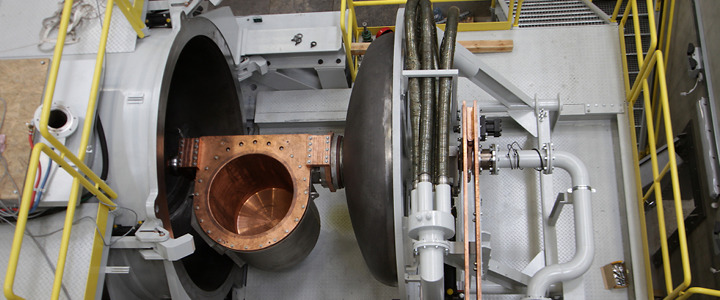Europe’s biggest aerospace castings facility now operational
22 March 2017A castings facility capable of producing some of the biggest titanium aerospace components in the world is now operational at the University of Sheffield Advanced Manufacturing Research Centre (AMRC).
Construction of the furnace for the AMRC Castings Group was completed last year and in the past few weeks the first tests or ‘hot commissioning’ as it is known, have been completed successfully.
The furnace has three interchangeable crucibles with the capacity for melting 250kg, 500kg and 1000kg of metal, which give it the versatility to produce components with a finished weight ranging upwards from 60kg.
A molten mass in excess of 1000kg is required to make a 500kg titanium casting and only a handful of furnaces exist globally that are capable of casting near net shape aerospace components of this size.

The AMRC Castings Group Titanium Caster, showing (top to bottom) the electrode delivery and power supply system, melting and casting chambers.
With leading aerospace primes and manufacturing companies already lining up to collaborate on research, AMRC Castings is conducting initial paper and pilot studies to explicitly identify the risks and value streams associated with casting large-scale near-net shape components in titanium.
This research aims to refine and enhance the casting process, reassuring engineers that casting can create lower buy-to-fly ratios for large-scale aerospace components; whilst maintaining the performance expectations when compared to their forged counterparts.
AMRC Castings Research and Development Manager, Mark D’Souza-Mathew, said: “AMRC Castings has over 15 years of experience in casting titanium and we are now aiming to assist companies considering a transfer of manufacturing from forged to cast for the production of large-scale near-net shape components.
“The cost savings with near-net shape castings are huge, with efficiencies in wastage and time-savings on the machining and finishing processes. Buy-to-fly ratios are improved from 5:1 with typical forged components down to 1.5:1 via the cast route,” added Mark.
Casting can produce superior material properties to both forging and machining. In particular, the new furnace built at AMRC Castings’ facility allows enhanced cooling to better control the material microstructure.
Mark said: “We are reviewing the alternative manufacturing technologies to focus on our strengths, delivering to the end-users improved part complexity and ‘light-weighting’, realising reductions in manufacturing costs and operational emissions.”
“We are working with the Aerospace Technology Institute and the High Value Manufacturing Catapult to define a programme of work and explore the boundaries of large-scale near-net shape castings. This will include retro-fitting the workshop floor with sensors to extract process related information, with a view to developing manufacturing intelligence and supporting simulation software.
“In addition to simulating the melting and pouring stages, we also aim to apply Finite Element Analysis to the shell development stage. The aims are to improve process consistency and achieve manufacturing excellence, providing end-users with an increased level of confidence when manufacturing high integrity parts.”
AMRC Castings’ new furnace is part of a major investment and R&D programme, designed to enable UK companies to break into global markets for largescale titanium aerospace engine and structural components and is backed by the UK’s Aerospace Technology Institute; innovation agency, Innovate UK; and High Value Manufacturing Catapult. It will be ready for industrial access around Summer 2017.
The wider goal for the AMRC is to establish the UK’s position as a leading supplier of this high-value, high-impact technology. With dissemination to the participating supply chain strengthening existing operations, developing strong business models for new operations such as volume production foundries and concentrating intellectual property; increasing skill levels and generating jobs within the UK.
For more information contact Rebecca Fergucon, AMRC Communications Officer on 0114 222 6662 or r.ferguson@amrc.co.uk


